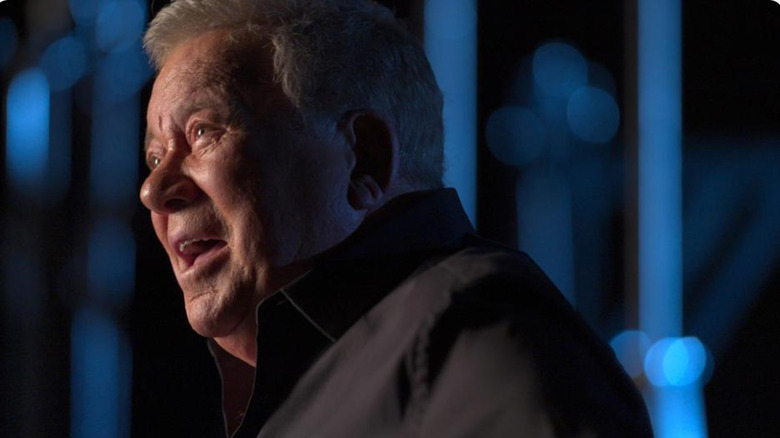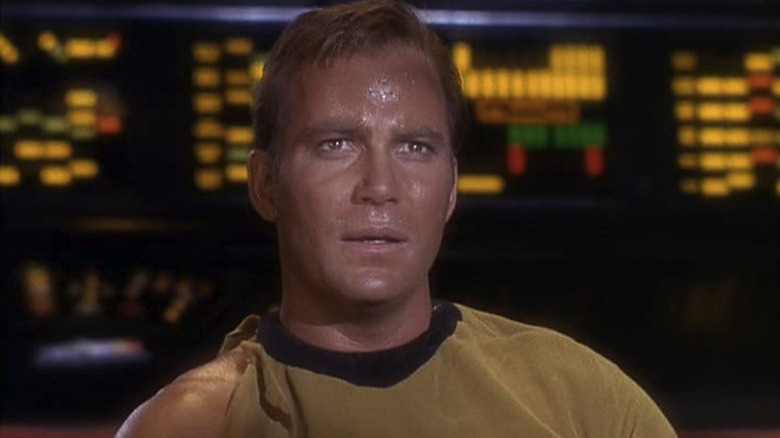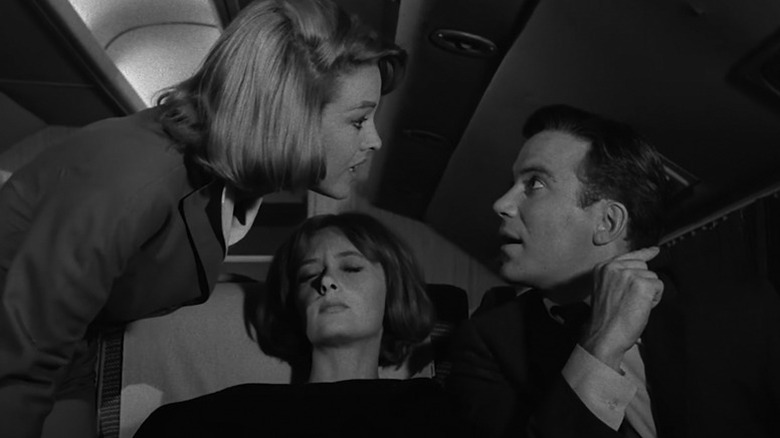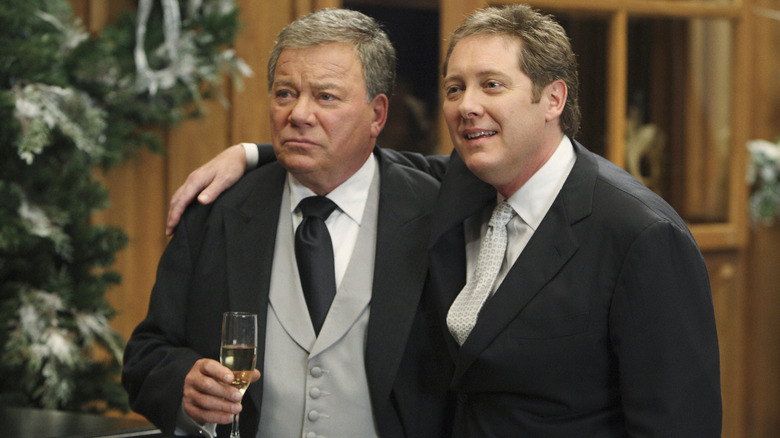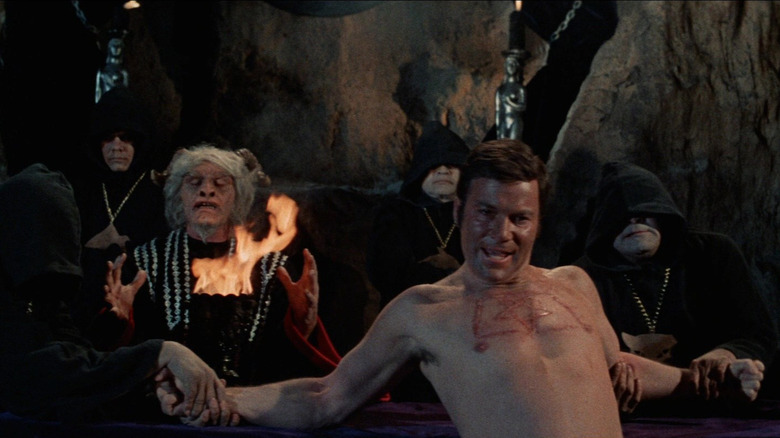You Can Call Me Bill Director Focused On Mortality And Honesty In His William Shatner Doc [Exclusive Interview]
Documentary director Alexandre O. Philippe has tackled many nerdy subjects over the course of his career. In "78/52," he hyper-focused on the shower scene in Alfred Hitchcock's "Psycho." In "The People Vs. George Lucas," he examined the complicated relationship fandom had with George Lucas post-prequels and pre-Lucas selling his company to Disney. In "Leap of Faith," he dug into the psyche of director William Friedkin and how much of the filmmaker made its way into the DNA of "The Exorcist."
His latest film is focused on another titan of geekdom: the one and only William Shatner. "You Can Call Me Bill" premiered at SXSW just a few days before the beloved actor's 92nd birthday, and it isn't your typical talking-head career retrospective. You could easily do a whole feature length doc just on how Shatner's performance as Captain Kirk on "Star Trek" has influenced pop culture and storytelling, and while you do get Shatner talking about his greatest hits, the aim for this movie is for the prolific actor to have the final word on who he is as a man and what he's learned about the world at large in his 90+ years on the planet.
I had the chance to sit down with Philippe while he was in Austin for his SXSW premiere to dig a little deeper into the documentary and his lasting impression of the nearly mythological man himself.
Note: This interview has been lightly edited for clarity and brevity.
'This is what matters. You guys need to be good to each other. You need to care for this planet'
I think we should start with the fact that you've done movies on Hitchcock, Lucas, Friedkin, and now Shatner. So are you just kind of collecting all the geek icons?
[laughs] It's interesting. In retrospect, you look at it and it's like, yeah, okay, it's sort of checking the boxes, but no, I'm really following my passion to make films about specifically the movies and the scenes and sequences and moments in cinema that transcend the medium of film and become cultural events, and to try to interrogate why those films are so important to us, why they resonate and continue to resonate so many years later. I think it's extraordinarily important to ask those questions, because in a way, it's part of the exercise of trying to figure out who we are and understand how we evolve and change as a culture. I mean, pop culture — that's why I've always believed it's so extraordinarily important.
Yeah, it's very powerful and it's something you can't predict. There's people getting paid millions of dollars trying to predict what hits and why and where, and you can never really tell, which is fascinating when you have somebody like Shatner. You have somebody who has been such a cultural icon for, at this point, well over 60 years. And he's still going strong. You can do an impression of Shatner to kids in malls, and they would know what you're doing to this day, and you can't stay the same for almost anybody else that was on TV in the '60s.
It's very true. It's very true.
So is that what drew you to him?
This is a little bit different from many of the other films that I've made in the sense that it's a very intimate, up close and personal portrait of him. So it's really a film about him as a human, I think, more than as an icon or the myth or whatever. Of course, we're using a number of clips from his filmography as almost avatars really, which I think is really interesting ... he's played a number of characters who have talked about the many themes that are a great deal of importance to him as a human. So there's a parallel between William Shatner the human, and William Shatner's many, many roles, many masks that he's worn.
I mean, he's going to be 92 in a few days. We all wish him a long life, but he's not going to be around probably for another 20 years. So he's here for a limited amount of time and I feel like it's almost like your grandfather saying, "This is what matters. You guys need to be good to each other. You need to care for this planet."
So there's a clear environmental message. There's a message about what it means to boldly go into your life, what it means to live a life fully lived, to do good deeds, to do something worthwhile while we're here on this planet. I think those are messages that are very important. And in this day and age, where there's so much negativity and so much division and all that stuff, it's nice to have Shatner just say, "Let's be good to each other."
'There is something really cinematic about the messages he's trying to convey'
It's also interesting because a lot of times, these icons don't get to have the final say on what they want their legacy to be.
That's right.
Sometimes they'll write an autobiography, but there's something different about the visual medium, especially when you know them through a visual medium.
Totally.
Was that your goal for this doc? To be the final word on who Bill Shatner was?
Yeah. Well, of course he's written books, but I believe, as you said, in the power of moving pictures, and I think there is something really cinematic about the messages he's trying to convey. So to me, that sort of parallel between him as a human and the roles that he's played is only something that he can convey through cinema in a pointed, emotionally felt way. So I'm really hoping this film will resonate on that level.
How did you get involved in this in the first place? Is this something he approached you with, or is this something you approached him wanting to do?
It was really strange because we had worked with Legion M on "Memory: The Origins of Alien" and last year I called David Baxter at Legion M just to touch base. I'd heard that William Shatner was their new spokesperson. I just very sort of casually asked, "Has there ever been a doc about him?" And he said, "No, no, but he's been approached many times and always said no." And I said, "Well, what do you think? Would you be willing to talk to him?"
So they approached him, and of course he was very kind of skeptical at first, but then they told him about the film that I did on Friedkin and shared some of the great words that Friedkin had to say about the film. So eventually, he was like, "Okay, fine. I'll meet this Alexandre guy."
They set up a lunch and I was fully ready to pitch my approach for the film. What was really interesting is that the conversation never went there. All he wanted to know was who I was, what I'm thinking, how I view life, what do I believe? It was a very personal questions. He wanted to figure out who I was as a human. And by the end of lunch he said, "All right, when do we do this?" And that was that.
It was that easy.
That's all it took.
All you've got to do is be a good person.
I think all the stars were aligned. I mean, obviously, he really has a great belief in Legion M and in their model as well. I also love them. My company, Exhibited Pictures, and Legion M, this is our second time working together, and we're just a big family. They're wonderful. They're just great, great people. So all the stars aligned for this project. I mean, it's crazy to think that literally, I met Bill for the first time, I think it's a year and a week ago.
'The theme of death comes back in one way, shape, or form through each chapter'
What was your background on Shatner? Did you grow up a fan of his? Did you grow to be a fan of his?
I don't think that I would consider myself a Trekkie. I certainly haven't watched every episode, but I love "Star Trek," but I also really love a lot of his other characters. Even the Priceline Negotiator is a big deal. I think it's such a really great, iconic advertising character. But you look at the depth of his filmography from "Judgment at Nuremberg" to "The Outrage" to obviously "The Twilight Zone" and some of the rare titles...
I noticed you're skipping over "The Devil's Rain."
"Devil's Rain," yeah. Which, I will say, is not my favorite. It's not my favorite, but that's okay.
But it is a highly entertaining movie. You've got Ernest Borgnine and Shatner going head-to-head.
Yeah, that's pretty good. So it's daunting because where do you even begin with Shatner? The research was intense, and of course I could have spent another year researching, but we didn't have that luxury, but I'm very happy with the clips that we have. I think there's a lot of poetic connections between his characters and his person that worked really well in the film.
I can understand there might be a temptation to focus on his biggest role. I mean, you could focus on Kirk and focus on the stuff that you know the vast majority of the audience knows him from. So how did you find that balance of, "Okay, of course we're going to give you the 'Star Trek' s***, but here's this other picture that gives you the fully rounded view of this guy"?
The structure is fully thematic. The film is told in chapters, and each chapter is actually an extrapolation of one of his autobiographical songs. So the title of each chapter relates to a song of his, and therefore a theme that has a great deal of importance to him now at 91 years old.
So we shot everything in an 18,000 square foot sound stage and the whole idea was to strip it down, to make it completely bare. You could see all the equipment in the background and everything. This idea of this is Bill, he's going to take off the mask, he's going to reveal who he is.
It was a three camera setup, and each chapter has a very distinct look within that 18,000 square foot stage to visually echo the world of that theme that he's going to dive into, but as a whole, really, the film is essentially a meditation on mortality and our place in the cosmos. The film is about death and the theme of death comes back in one way, shape, or form through each chapter, including the prologue, which is about his first encounter with death when his dog died, to the epilogue, which is his wonderful song, "I Want To Be A Tree."
How do you do that without making it a bummer? Because it sounds like you could easily fall into making this like an early wake if you're not careful.
It's a balance, and it was most definitely a very strong consideration because the key is to make the film poignant. This is not the film about William Shatner that you would expect to watch. It has a very sort of distinct vibe. It has very funny moments, it has very intimate, very poignant moments, and it does have those bummer moments.
When we tackle chapter 4, which is called "Loneliness," he went to some really dark places, and that chapter was a very difficult interview. I couldn't get him out of it. And I was concerned. I was really concerned precisely about what you said — is that going to turn the whole thing into a bummer?
It was a blessing. It took me a while to be able to revisit the material and see how we were going to build this chapter. It is, without a doubt, the darkest chapter, but there is a depth to it and a sort of power to it that I'm very thankful he took me there, because I think it'll show a different side of him as well. But, of course, once you go to the depth of that darkness, you have to bring it back up and I think the film ends on a very sort of hopeful, beautiful note. It's his gift, I think, to future generations.
'I think he loves the potential of humanity'
It seems like it's also very honest, and people look for honesty in their entertainment, whether it's a superhero movie or a horror movie or whatever. They want a little feeling of authenticity and honestness, but especially when you're doing a documentary on an icon. If it was just "Yep, everything is great, I'm always great, we're all great," then...
Nobody cares about that.
Yeah. It feels like a waste of time. So it sounds like that even if that fourth chapter is dark...
That chapter now is one of my favorites. I mean, as dark as it is, it's a really interesting window on William Shatner.
Going into this, you must have had your own conception of who this person was. What did you discover about him as you got this more intimate, honest look at him?
What really struck me was I think he is a philanthropist in the true sense of the word. I think he loves the potential of humanity. I think he hates what humans are doing to this planet, but I still think he loves humanity enough to deeply care for it. I love his concern for future generations. I love his concern for animals and the planet. He's very committed. He's, I think, just a remarkable human, not just in terms of what he's done, what he's accomplished, but the fact that he's still going stronger than ever at his age. He's truly an inspiration.
Yeah. I'm 42 years old, and I'm more than happy to laze around on the couch, and this dude's going up into space.
I've seen him where he can't just be sitting around for 15 minutes. He has to do something. It's really wild.
What is the predominant thing you hope the audience walks away from this movie with?
Love. Not just for the film, not just for Bill, but for this extraordinary miracle that it is to be alive on this planet. I think it's very easy to forget how miraculous it is that we're here. But I think it's a celebration of his life; it's a celebration of his career. And, again, I think there's such positivity, such a bright message that he wants to convey that I really hope people embrace that. And whether you barely knew of Shatner or whether you're a massive fan or a massive Trekkie or whatever, a massive fan of "Boston Legal"...
Or "The Devil's Rain."
Or "Devil's Rain," that you walk out of the film feeling like, "Wow, that surprised me. That was not the portrait of Shatner that I quite expected it to be, and I got more out of it than I thought I would." I'm really hoping that's what it is, because we worked very hard for that. I think people will feel that. I really do.
"You Can Call Me Bill" does not have an official release date yet.
